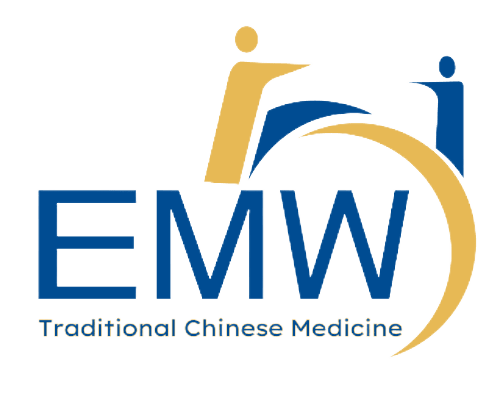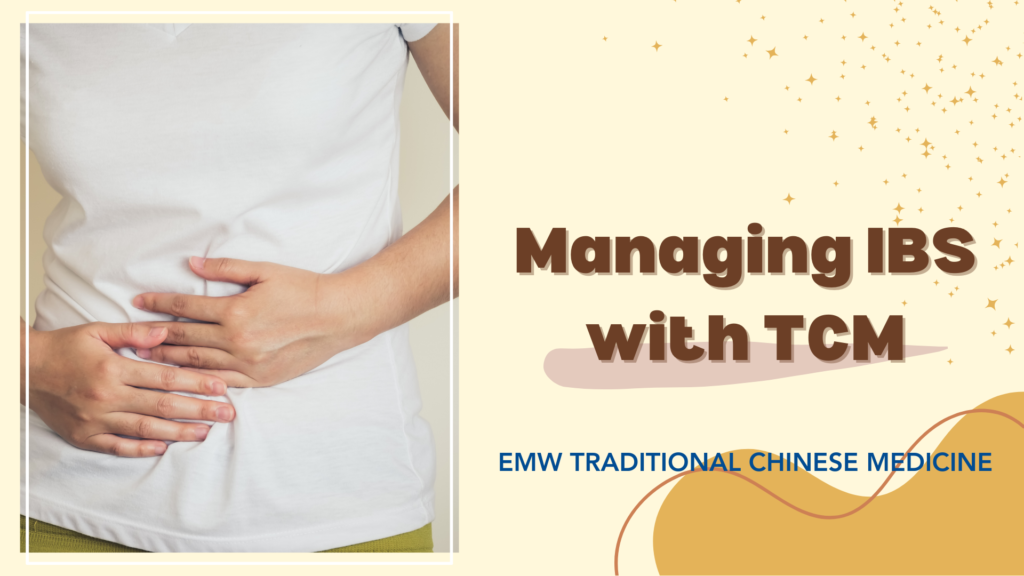Treat IBS Naturally with TCM
Irritable bowel syndrome (IBS) is a common gastrointestinal disorder with a high incidence in the general population. The diagnosis of IBS is mainly based on exclusion of other intestinal conditions through the absence of inflammatory markers and specific antigens. EMW Physiotherapy & TCM Clinic devises a holistic approach to treat IBS naturally with Traditional Chinese Medicine(TCM).
The current pharmacological treatment approaches available focus on reducing symptom severity while often limiting quality of life because of significant side effects. This has led to an effectiveness gap for IBS patients that seek further relief to increase their quality of life. Complementary and alternative medicines (CAM) have been associated with a higher degree of symptom management and quality of life in IBS patients.
Over the past decade, a number of important clinical trials have shown that specific herbal therapies, hypnotherapy, cognitive behavior therapy, acupuncture, and yoga present with improved treatment outcomes in IBS patients.
Types of IBS
There are two major clinical types of IBS described in Western medicine: diarrhea-predominant IBS and constipation-predominant IBS.
Diarrhea-predominant IBS is characterized by diarrhea which occurs immediately after waking up or immediately after eating. Other common symptoms include loose stools, intestinal pain, bloating, urgency, and urinary incontinence.
Constipation-predominant IBS manifests with pain over at least one area of the colon and periodic constipation. This pain may be continuous or it may come in bouts, and is often relieved by moving the bowels. The stool often contains mucus. Associated symptoms include bloating, gas, nausea and dyspepsia. Eating can commonly trigger these symptoms.
Causes of IBS
- Lack of dietary fiber including plant-based meals
- Under consumption of liquids, dehydration
- Over consumption of milk products (could also cause diarrhea in some)
- Certain medications
- Excessive use of over-the-counter laxatives
- Overuse of painkillers, anti-depressants, iron supplements, antacids
- Frequent long-distance traveling (mostly from one time-zone to the other)
- Lack of proper physical activity
- Postponing having a bowel movement when the urge arises
- Emotional triggers
- Childhood trauma
- Dysfunction of the vagus nerve, Brain-Gut connection
- Excessive processed foods including sugar, oils, coffee & alcohol
How diet plays a role in IBS Management
Diet modifications are not generally considered CAM and usually are the first step in reducing IBS symptom severity even before pharmacotherapy is initiated. This is because dietary modifications can help to treat IBS naturally, especially with the help of TCM. However, exclusion diets can often be supplemented with CAM to reduce specific symptoms such as bloating and distension. Exclusion diets may benefit patients with a known allergy and those in post-infectious IBS and consists of removing wheat, dairy products, eggs, coffee and caffeinated beverages, yeast, potatoes, and citrus fruits[1]. Despite the reported successes with exclusion diets, they may, at times, be hard to follow thereby resulting in bouts of increased IBS symptom severity. While dietary restrictions may benefit some IBS patients, entirely skipping meals actually has shown to worsen IBS symptoms.
Some contribution to intestinal symptoms may come from a diet that is high in fat, carbohydrates, and sugar alcohols. It has been shown that increased fat consumption is linked to increased stool numbers and diarrhea and therefore should be considered as a factor in worsening IBS-D[2]. Fructose-rich food and beverage items (soft drinks, baked and packaged goods, cereals) can also aggravate flatulence, abdominal discomfort, and diarrhea and should therefore be monitored in IBS patients[1]. Especially poorly absorbed sugar alcohols that are present in diet soft drinks and low carbohydrate foods can exacerbate GI symptoms[2]. Together with general restrictions on carbohydrate intake, lactose intolerance and malabsorption appear to be more prevalent in IBS patients. If lactose is not absorbed from the GI tract it is metabolized via the gut bacteria and leads to increased bloating, distension, and diarrhea which can aggravate IBS symptoms[3].
Fiber is often recommended as a dietary change to reduce global IBS symptoms but the clinical data to date are less clear. It has been shown that soluble fiber can lower GI symptoms in IBS-C although the data supporting it is highly variable both in the amount of fiber consumed (ranging from 5-30 g/d) and the duration of the trials (3-16 wk)[4]
How to treat IBS naturally with TCM
Evidence-based medicine has demonstrated that irritable bowel syndrome (IBS) can benefit from multiple treatment options to address this often complex disorder. One of these options is Traditional Chinese Medicine (TCM), including acupuncture, herbal formulas and dietary therapy as there is more research on how to treat IBS naturally with TCM. In a 2015 systematic review of randomized controlled trials of Chinese herbal formulas and IBS, patients taking traditional Chinese herbs alone or in conjunction with usual care improved at a higher percentage than those using only conventional medicine [5]. Additionally, there were no adverse events reported in the trials among patients taking the Chinese herbal formulas. The authors noted that physiological responses of Chinese herbal formulas responsible for their healing effects include the modulation of smooth muscle of the gastrointestinal tract, regulation of neurotransmitters, reduction of intestinal inflammation and restoration of intestinal flora.
IBS can be triggered by stress and anxiety. The syndrome can also perpetuate these psychosomatic discomforts. Acupuncture provides time-tested relief to stress and anxiety thereby treating this aspect of IBS. According to TCM theory, the digestion is our central axis. It is the prime source of energy from the breakdown of food. If this system is dysfunctional we may feel irritable, fearful, anxious, or unsettled. On a physical level this may result in IBS, constipation, urgent loose stools, pain and bloating. One of my paramount focuses as a practitioner of Chinese medicine is to treat the imbalances of the gastrointestinal tract and support it’s functions of assimilating nutrients from food, promoting motility, normalizing bowel function and decreasing inflammation. Similar to properly recommended Chinese herbs, acupuncture provides safe, cost effective and health promoting care for IBS
Can TCM work with Western Medicine?
Recently, a research group evaluated the clinical efficacy of the combination of TCM and Western medicine in the treatment of IBS via a series of meta-analyses. Compared to the Western medicine treatment alone, their results showed that TCM combined with Western pharmacological interventions significantly improved global symptoms of IBS (RR = 1.21; 95%CI: 1.18-1.24). Moreover, the relapse rate was lower, and no serious adverse events were reported. These results would provide further evidence indicating that treating IBS with integrated traditional Chinese medicine with Western medicine showed better efficacy than treating with conventional Western medicine alone. This also shows that there is more research ongoing on how to treat IBS naturally with TCM.
Our TCM Physicians
References
[1] Lea R, Whorwell PJ. The role of food intolerance in irritable bowel syndrome. Gastroenterol Clin North Am 2005; 34: 247-255 [PMID: 15862933]
[2] Levy RL, Linde JA, Feld KA, Crowell MD, Jeffery RW. The association of gastrointestinal symptoms with weight, diet, and exercise in weight-loss program participants. Clin Gastroenterol Hepatol 2005; 3: 992-996 [PMID: 16234045]
[3] Saberi-Firoozi M, Khademolhosseini F, Mehrabani D, Yousefi M, Salehi M, Heidary ST. Subjective lactose intolerance in apparently healthy adults in southern Iran: Is it related to irritable bowel syndrome? Indian J Med Sci 2007; 61: 591-597 [PMID: 18025745]
[4] Yang J, Deng Y, Chu H, Cong Y, Zhao J, Pohl D, Misselwitz B, Fried M, Dai N, Fox M. Prevalence and presentation of lactose intolerance and effects on dairy product intake in healthy subjects and patients with irritable bowel syndrome. Clin Gastroenterol Hepatol 2013; 11: 262-268.e1 [PMID: 23246646 DOI: 10.1016/j.cgh.2012.11.034]
[5] Li CY1, Ain Mohd Tahir N, Li SC. A systematic review of integrated traditional Chinese and Western medicine for managing irritable bowel syndrome. Am J Chin Med. 2015;43(3):385-406. doi: 10.1142/S0192415X15500251. Epub 2015 Apr 27.






